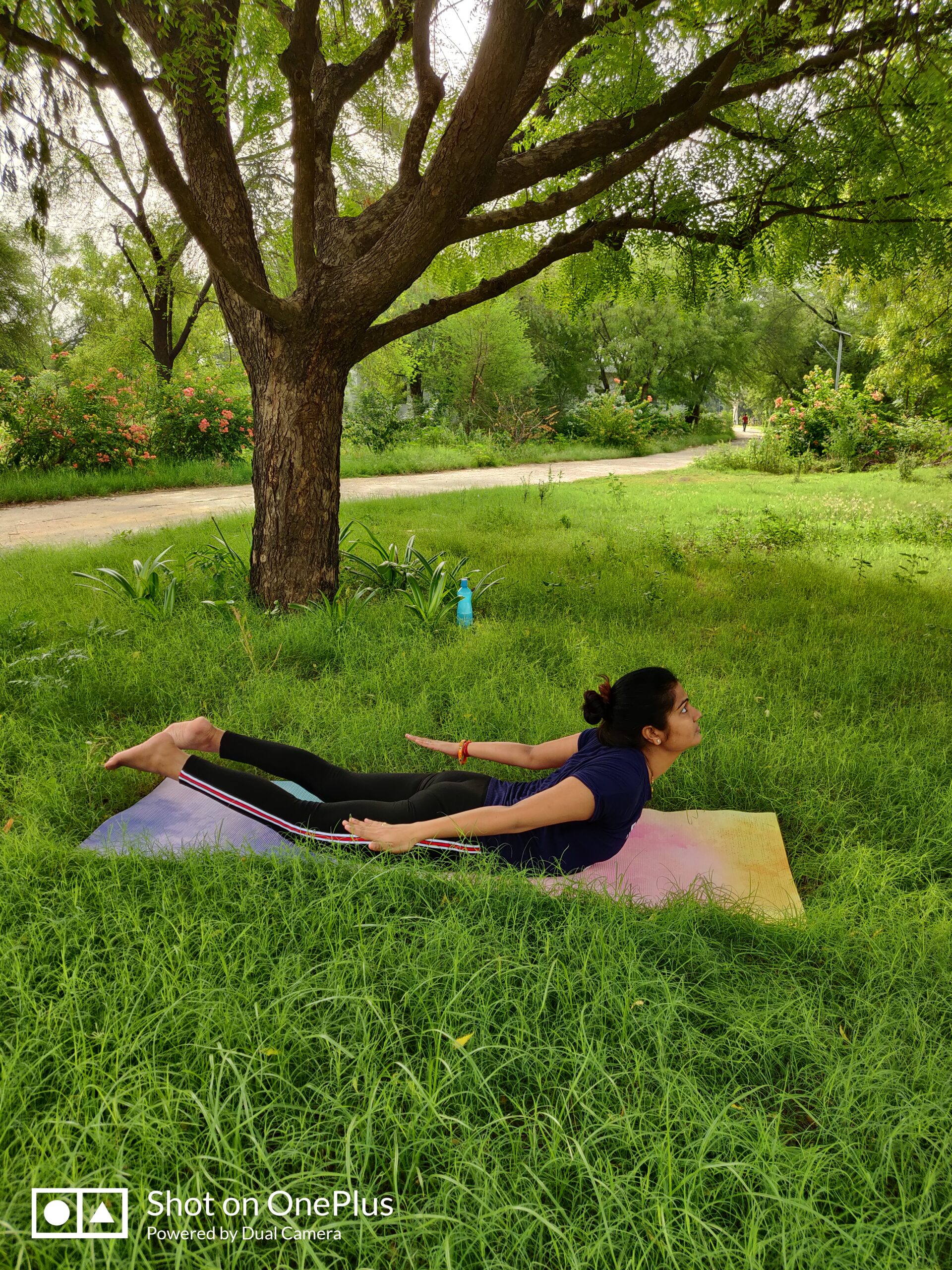Introduction: Anxiety, a prevalent and multifaceted mental health concern, affects countless individuals globally. While conventional treatments exist, naturopathic approaches offer a unique and comprehensive perspective on managing anxiety. In this article, we explore innovative naturopathic treatments and therapies that extend beyond the ordinary, delving into holistic strategies to foster emotional well-being and tranquility.
Causes and Symptoms of Anxiety: Unraveling the Complex Web
Anxiety, a common mental health concern, can be triggered by a complex interplay of factors. From genetic predisposition to environmental stressors, understanding the causes and recognizing the diverse spectrum of symptoms is essential for effective management. In this section, we delve into the primary causes of anxiety and the wide range of symptoms associated with this condition.

Causes of Anxiety: Unveiling the Underlying Factors
- Genetic Predisposition: Family history of anxiety disorders increases the likelihood of developing anxiety due to inherited genetic traits.
- Neurochemical Imbalance: Disruptions in neurotransmitters like serotonin, dopamine, and norepinephrine impact mood regulation and contribute to anxiety.
- Brain Structure and Function: Abnormalities in brain regions like the amygdala and prefrontal cortex affect emotional processing and fear responses.
- Environmental Factors: Chronic stress, traumatic events, childhood experiences, and major life changes can trigger or exacerbate anxiety.
- Health Conditions: Certain medical conditions, such as thyroid disorders and cardiovascular issues, can lead to anxiety symptoms.
- Substance Use and Withdrawal: Alcohol, drugs, and caffeine can provoke or worsen anxiety. Withdrawal from substances can also trigger anxiety.
Common Symptoms of Anxiety: A Wide Spectrum of Manifestations
Anxiety manifests in various physical, emotional, and behavioral symptoms, each affecting individuals uniquely:
- Physical Symptoms:
- Rapid heartbeat and palpitations
- Shortness of breath or hyperventilation
- Sweating and trembling
- Muscle tension and aches
- Gastrointestinal distress, such as nausea and diarrhea

- Emotional Symptoms:
- Excessive worry and persistent fear
- Irritability and restlessness
- Difficulty concentrating and racing thoughts
- Anticipating the worst outcomes
- Feelings of impending doom
- Behavioral Symptoms:
- Avoidance of situations that trigger anxiety
- Social withdrawal and isolation
- Compulsive behaviors or rituals
- Sleep disturbances and insomnia
- Impaired decision-making and indecisiveness
- Cognitive Symptoms:
- Overthinking and excessive self-criticism
- Catastrophic thinking and irrational fears
- Inability to focus on tasks
- Memory difficulties and mental fog
Naturopathic Treatments and Therapies for Anxiety: A Holistic Approach to Inner Peace
Naturopathic medicine offers a comprehensive array of treatments and therapies that focus on addressing the underlying causes of anxiety while promoting emotional well-being. By combining natural interventions, mind-body practices, and personalized care, individuals can find relief from anxiety’s grip and cultivate a sense of calm. In this section, we explore a range of naturopathic treatments and therapies that form a holistic approach to managing anxiety.
1. Herbal Medicine for Calming the Mind:
- Lavender (Lavandula angustifolia): Lavender’s soothing aroma can reduce anxiety and promote relaxation.
- Passionflower (Passiflora incarnata): This calming herb eases nervous tension and supports a tranquil mind.
- Valerian (Valeriana officinalis): Valerian root can help alleviate mild anxiety and promote restful sleep.

2. Nutritional Support for Brain Health:
- Omega-3 Fatty Acids: Found in fatty fish, flaxseeds, and walnuts, omega-3s support brain health and mood stability.
- Magnesium: This mineral relaxes muscles and supports a calm nervous system, reducing anxiety.
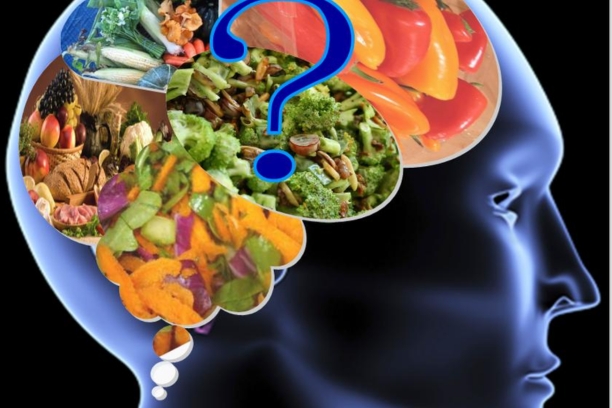
3. Mind-Body Techniques for Emotional Resilience:
- Mindfulness Meditation: Mindfulness cultivates present-moment awareness, reducing anxiety’s grip and promoting emotional resilience.
- Yoga and Breathwork: Yoga postures and pranayama techniques calm the nervous system and enhance self-awareness.
- Progressive Muscle Relaxation: This practice helps release physical tension and calm the mind.
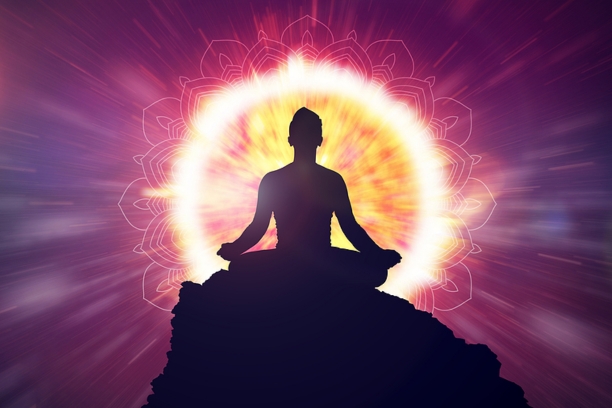
4. Acupuncture and Traditional Chinese Medicine:
- Acupuncture: By stimulating specific points on the body, acupuncture can harmonize energy flow and alleviate anxiety.
- Herbal Formulas: Traditional Chinese herbs tailored to an individual’s constitution can promote emotional balance.

5. Aromatherapy and Essential Oils:
- Chamomile: Chamomile oil’s soothing scent can reduce stress and induce relaxation.
- Frankincense: This oil promotes a sense of tranquility and helps alleviate anxious feelings.

6. Shirodhara Therapy: Anointing Mind and Soul
Time-Honored Ritual: Shirodhara, a gift from Ayurveda, involves the rhythmic pouring of warm herbal oil onto the forehead, inducing deep relaxation and tranquility.
Nurturing Nervous System
- Neurological Calm: Shirodhara activates the parasympathetic nervous system, reducing stress hormones and calming anxiety.
- Sensory Experience: The soothing touch of warm oil calms the senses, fostering emotional grounding.

Emotional Release and Renewal: Shirodhara’s flow serves as a conduit for emotional release, offering a pathway to process and let go of anxiety-related emotions.
7. Hydrotherapy:
Immersion in Elemental Bliss: Hydrotherapy utilizes water’s therapeutic properties, promoting relaxation, improved circulation, and emotional well-being.
Holistic Techniques for Anxiety Alleviation
- Warm Baths: Soothing warm baths ease muscle tension, quiet the mind, and encourage relaxation.
- Contrast Hydrotherapy: Alternating between warm and cool water enhances blood circulation and nervous system balance.

Mindful Connection to Nature: Hydrotherapy’s sensory experience mimics the soothing touch of nature, grounding individuals in the present moment and fostering emotional stability.
8. Lifestyle Adjustments for Stress Reduction:
- Regular Exercise: Physical activity boosts endorphins, reduces tension, and supports emotional well-being.
- Balanced Sleep Patterns: Prioritizing sleep enhances emotional resilience and overall wellness.
- Stress Management Techniques: Incorporating techniques such as journaling, art therapy, and nature walks.
9. Professional Guidance and Personalized Care:
- Holistic Assessment: Naturopathic doctors explore individual history to understand the root causes of anxiety.
- Personalized Treatment Plans: Comprehensive protocols may include herbal remedies, nutritional adjustments, and mind-body practices.
10. Mindful Technology Use and Detoxification:
- Digital Detox: Limiting screen time and practicing mindfulness in technology use can reduce information overload and anxiety triggers.
- Nature Immersion: Spending time in nature promotes relaxation and reduces stress hormones.
Yogic Management for Cultivating Calm: A Path to Anxiety Relief
Yogic practices offer a holistic and transformative approach to managing anxiety. By integrating mindful movement, breath awareness, and relaxation techniques, yogic management empowers individuals to navigate the complex landscape of anxiety and find inner serenity. In this section, we explore a selection of yogasanas (yoga postures) and yogic techniques that contribute to emotional balance and alleviate the grip of anxiety.
1. Tadasana (Mountain Pose): Tadasana establishes a foundation of stability and mindfulness. It improves posture, relieves tension, and fosters a sense of grounded awareness.
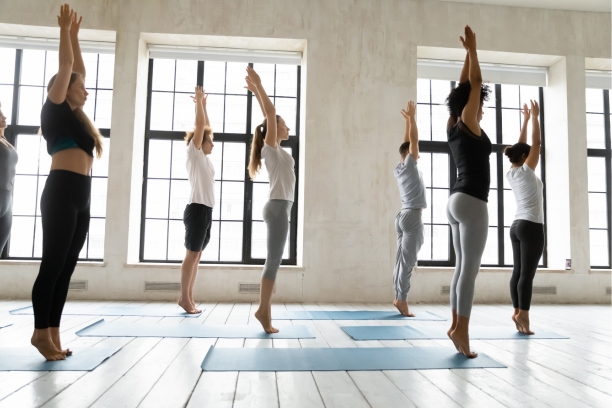
2. Uttanasana (Standing Forward Bend): Uttanasana calms the mind by promoting blood flow to the brain and relieving tension in the spine. It encourages introspection and relaxation.
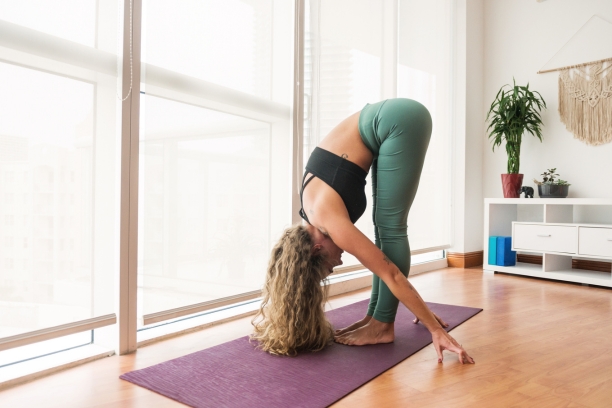
3. Adho Mukha Svanasana (Downward-Facing Dog Pose): This inversion posture enhances blood circulation to the brain, releases tension in the shoulders, and promotes mental clarity.
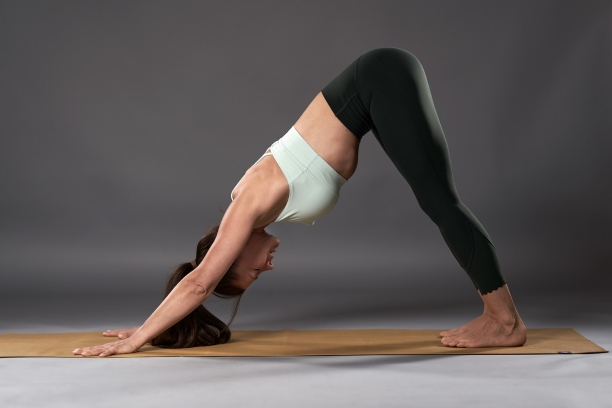
4. Marjariasana-Bitilasana (Cat-Cow Pose): This gentle flow between cat and cow poses alleviates tension in the spine, massages abdominal organs, and encourages breath awareness.
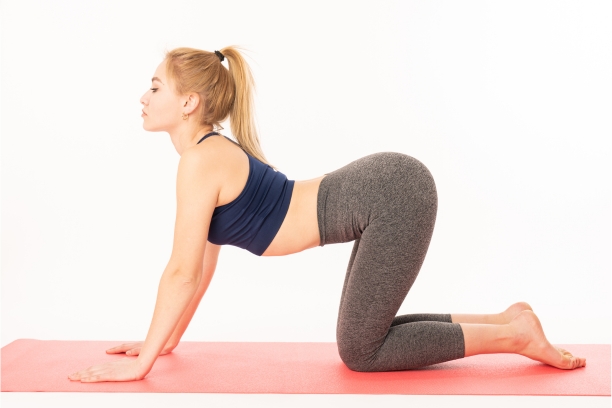
5. Bhujangasana (Cobra Pose): Bhujangasana opens the heart center, improves posture, and stimulates the nervous system, fostering emotional balance.
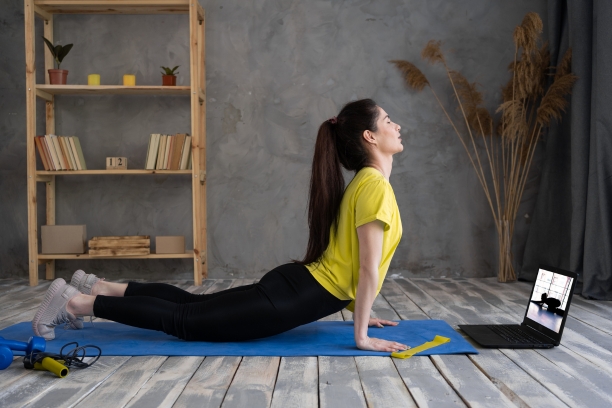
6. Viparita Karani (Legs-Up-the-Wall Pose): Viparita Karani is a restorative inversion that encourages relaxation, enhances blood circulation, and reduces anxiety.
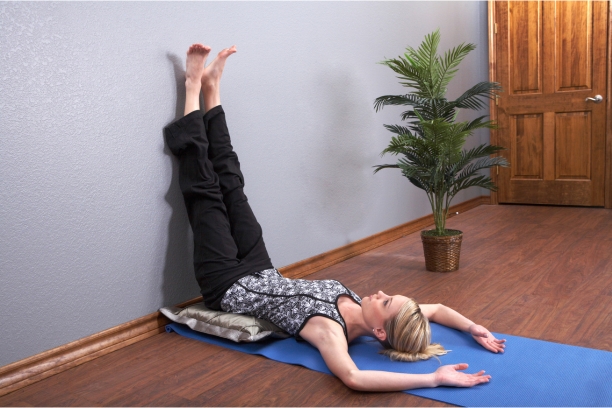
7. Nadi Shodhana (Alternate Nostril Breathing): This pranayama technique balances energy channels, calms the mind, and harmonizes the nervous system, reducing anxiety.
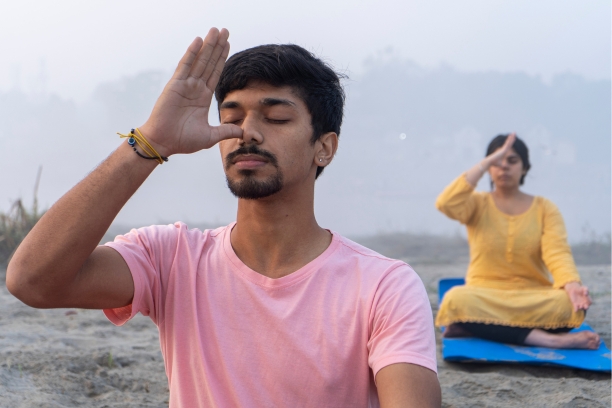
8. Bhramari (Bee Breath): Bhramari relieves stress and emotional tension by activating the parasympathetic nervous system. It encourages relaxation and emotional stability.
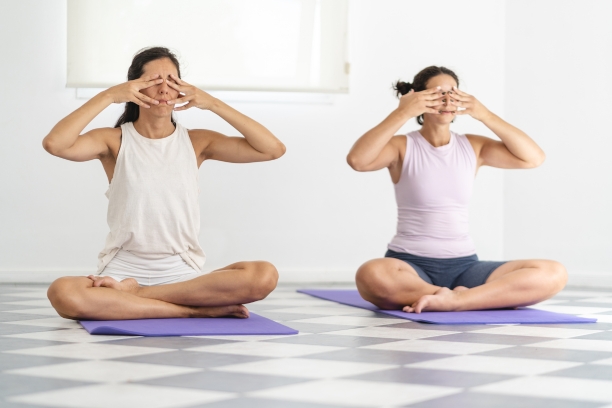
9. Yoga Nidra and Meditation: Yoga Nidra induces deep relaxation and promotes emotional healing. Meditation cultivates mindfulness and reduces anxiety’s grip.

10. Savasana (Corpse Pose): Savasana is a culmination of the practice, offering profound relaxation and integrating the benefits of the yogic journey.
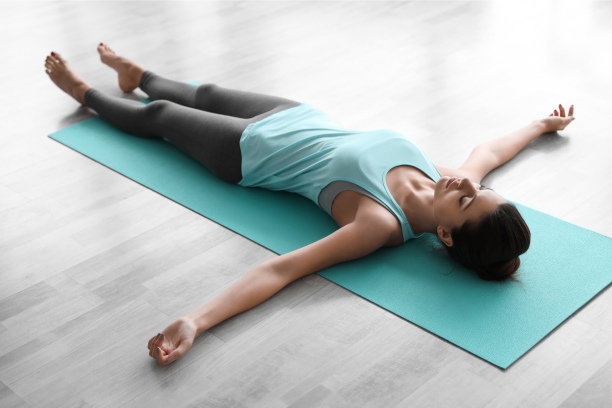
Yogic Management in Daily Life: Cultivating Mindfulness
Beyond the mat, mindfulness becomes a way of life. By integrating yogic principles into daily activities, individuals can reduce anxiety and enhance emotional well-being:
- Conscious Breathing: Practicing mindful breathing in everyday situations promotes emotional regulation.
- Mindful Eating: Eating mindfully fosters a strong mind-body connection and supports digestion.
- Grounding Techniques: Connecting with nature, barefoot walking, and grounding exercises anchor the mind in the present moment.
Deciphering Anxiety: Unveiling Its Complexity
Understanding Anxiety: Anxiety encompasses a range of emotional, psychological, and physical symptoms characterized by excessive worry, restlessness, and fear.
Factors at Play: Beyond neurotransmitter imbalances, genetics, trauma, and lifestyle factors contribute to the development of anxiety.

Conclusion: Naturopathic management of anxiety transcends the boundaries of conventional approaches.Understanding the multifaceted causes of anxiety and recognizing the diverse range of symptoms is the foundation for effective management. Naturopathic treatments and therapies provide a framework for individuals to address the root causes of anxiety while fostering emotional well-being. Yogic management for anxiety combines movement, breath, and mindful living to create a harmonious inner landscape. With regular practice, individuals can navigate anxiety’s challenges with greater resilience, fostering emotional well-being and inner peace.




